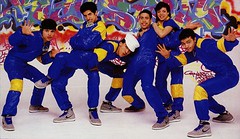The History of The Hip-Hop, Part I ('86 - '93)

Full disclosure, I'm was born in 1965, I grew up in Florida, and me and what became hip-hop ran into each other by accident while I was working at a record store and being a teen DJ at Roseland and Feathers teen niteclubs. The dancers - carrying rolls of linoleum - turned me on to the music. They TOLD me to get these records, so I did.
At age 42, I am not fronting. That's just how I got into hip-hop. And this is my take on it. (And I relied on Wikipedia for most of the links.)
There are several hip-hops. They may be controversial, but I think it's kind of a secret.
They have to do with epochs.
The first epoch is pre-hip-hop. It starts in '78 and goes to '82. This is RAPPER'S DELITE era.
No one even called it hip-hop. This is mostly singles (featured in countless Best-Of collections, but two of the best albums include:
Kurtis Blow - Kurtis Blow
Grandmaster Flash & the Furious Five - The Message
The second epoch is HIP HOP. Still no hyphen, and lots of people are still not calling it hip-hop ("Rap," it's called mainly, as in "I hate rap," which was so popular to say that people wore it on t-shirts.) This second epoch started in '83 and goes to '86. There is a lot of Adidas-wearing going on, and there is still lots of fun and lots of dances.
Run-DMC - Run-D.M.C.
LL Cool J - Radio
Whodini - Escape / Beastie Boys - Licensed to Ill
(***Yet my faves from this epoch are...)
Malcolm McClaren - Duck Rock
Afrika Bambaataa & Soulsonic Force - Planet Rock
Mantronix - The Album
The next era is what I call POST-HIP HOP. It is short. It is '87 to '88. The money has now got big. Nightclubs are filled with attitude now. Everything gets different. Intense. But some tracks still are too great to resist, and the dance floors at still filled.
Big Daddy Kane - Long Live The Kane / Kool Moe Dee - I'm Kool Moe Dee
Eric B & Rakim - Paid In Full
Biz Markie - Goin' Off / 2 Live Crew - Is What We Are
After the above, hip hop ceases to be just fun. True, good music continues to come out, but the idea of hip and hop has become commodified, and there is big money being made and the big corporate record companies have smelled it out. And dancing is considered dorky. (Great.) Anyhow,...
...a real schism occurs in hip hop now. One, HIP-HOP (now being capitalized, and with the all-important hyphen), includes some of the strongest studio material recorded.
The other, RAP, is about wanting to be dangerous.
HIP-HOP '87 - 90
bonus early ('86): Salt-N-Pepa - Hot, Cool & Vicious
A Tribe Called Quest - People Instinctive Travels And The Path Of Rhythms / De La Soul - 3 Feet High and Rising / Jungle Brothers - Straight Out The Jungle (***all 3 are one unique ste)
Beastie Boys - Paul's Boutique
Digital Underground - Sex Packets
RAP '87 - 90
Public Enemy - Yo! Bum Bum Rush The Show
Boogie Down Productions - By Any Means Necessary
...and, of course...
NWA - Straight Outta Compton / D.O.C. - No One Can Do It Better
*bonus pre-'87 albums: Ice-T - Rhyme Pays ('86) Too $hort - Raw, Uncut, and X-rated
Based on all of the above history and ground-breaking, the ROCKSTAR epoch begins, '91 to '93.
Cypress Hill - Cypress Hill / Dr Dre - The Chronic
Disposable Heroes of Hiphoprisy - Hypocrisy Is The Greatest Luxury
Wu-tang - Enter the Wu-Tang (36 Chambers)
X-Clan - To The East, Blackwards
At which above point I'll cut it off at...because I know you know the rest. :) But that's it, that's my take on hip-hop's epochs, and around '86 "hip hop" is over. It then becomes the two separate (although similar) forms, Hip-Hop and Rap, at which point I became more interested myself but stricly for "academic reasons" (although at the time, I was unaware that that's what I was doing, studying hip-hop.)
BTW, in '94, Bay Area "Mobbin' music" changed everything, in particular (believe it or not), E-40 and The Click's Down and Dirty.
[And incidentally, never buy the big label re-releases of any "Bay Area" rap music, as the samples are all removed or changed; Go to or contact Rasputin's or Amoeba's in Berkeley, and buy the originals.]
Then, in '95, The Fugees' The Score changed the world.
And that's my take on The History of the Hip-Hop World, Part I.
To be continued...?


0 Comments:
Post a Comment
<< Home